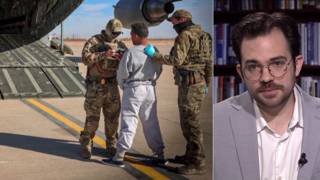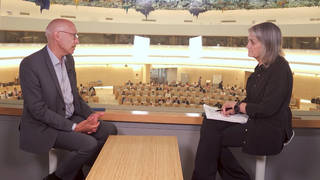
Topics
Guests
- Michelle Shephardnational security reporter for the Toronto Star and has been following the story of Omar Khadr since his arrest in 2002. She is the author of Guantánamo’s Child: The Untold Story of Omar Khadr. She was recently one of four reporters barred from covering further proceedings in the Khadr case at Guantánamo Bay.
We’re joined here in New York by Michelle Shephard, the national security reporter for the Toronto Star. She’s been following the story of the Canadian-born Omar Khadr since his arrest as a teenager in Afghanistan in 2002. She is the author of Guantánamo’s Child: The Untold Story of Omar Khadr. Michelle Shephard was among the four journalists who have recently been banned from covering military commissions in Guantánamo Bay for publishing the name of an interrogator involved in the case of Omar Khadr. The other journalists are Carol Rosenberg from the Miami Herald, the Globe and Mail’s Paul Koring, and Steven Edwards from Canwest News Service. [includes rush transcript]
Transcript
AMY GOODMAN: Well, I want to stay on the issue of Guantánamo, because we’re joined here in New York by Michelle Shephard, the national security reporter for the Toronto Star. She’s been following the story of the Canadian-born Omar Khadr since his arrest as a teenager in Afghanistan in 2002. She’s the author of Guantánamo’s Child: The Untold Story of Omar Khadr.
Well, Michelle Shephard was among four journalists who have recently been banned from covering military commissions in Guantánamo for publishing the name of an interrogator involved in the case of Omar Khadr. The other journalists are Carol Rosenberg from the Miami Herald, the Globe and Mail's Paul Koring, and Steven Edwards from Canwest News Service. Under the Pentagon's rules, journalists are not allowed to disclose the name of witnesses at Gitmo trials and were asked to always refer to the witness as “Interrogator Number 1.” But the name of the so-called “Interrogator Number 1” is in the public domain.
In 2008, Damien Corsetti was publicly identified as Khadr’s interrogator during a hearing in Guantánamo, and later that year he gave an on-the-record interview to Michelle Shepard, in which he denied torturing fifteen-year-old Khadr in Bagram. Khadr’s defense argues his confessions were obtained through coercion by Corsetti.
Well, Michelle Shephard, welcome to Democracy Now!
You have appealed the military’s ban on you.
MICHELLE SHEPHARD: We have. We have the appeal outstanding now, hope to hear in the next week what the result of that is.
I just want to correct one detail. Damien Corsetti was one of the interrogators at Bagram, but it’s actually a different interrogator who had his identity protected in this case. The issue is that we were told, according to protective orders in the court, that he had to be referred to as “Interrogator 1.” During —-
AMY GOODMAN: And Corsetti was not “Interrogator 1”?
MICHELLE SHEPHARD: No, that’s right. He was a separate interrogator. But as you mentioned, Interrogator 1 was somebody who I had an on-the-record interview with in 2008. In fact, he called me. And at that time, we used his name. And ironically, what he said during the interview was that he looked forward to testifying, to clear his name. This was the backdrop for the two weeks that we were covering the pretrial hearings for Omar Khadr. We tried to appeal the protective order, appealed to the judge. I personally sent the judge a note saying that we don’t have attorneys in Guantánamo, but we’d like to make a submission that we don’t believe there can be a blanket protective order on every witness that testifies. And in this case, in particular, this is somebody who was -— had a court-martial, was publicly identified, and convicted.
AMY GOODMAN: And he is? His name is?
MICHELLE SHEPHARD: Joshua Claus. And he was convicted for the — for being involved in the death of another detainee.
AMY GOODMAN: And this detainee was made very famous at Bagram?
MICHELLE SHEPHARD: Well, that’s right. The detainee was a taxi — an Afghani taxi driver by the name of Dilawar, and he was the subject of an Oscar-winning film called Taxi to the Dark Side. Interrogator 1 was part of that documentary.
So we have this blanket protective order that applies to all witnesses. And I just want to point out that it’s not the protective orders themselves. As journalists, we understand that there are going to be certain witnesses who do need their identity protected. We do that in federal court, civilian cases all the time. There’s publication bans. There are certain rules. And there are going to be witnesses who need their identity protected, who — for security reasons. They might be deployed again. They might have issues with their family. But this was a — it’s a blanket order that we had no way to appeal. And in this case, we would argue, it’s ludicrous. There was an excellent blog about the incident that said journalists are required now to have amnesia, that we forget who this person is in our reporting. And because we’re actually the ones on the ground reporting, doing the firsthand reporting, we’re restricted from mentioning facts that some blogger in his basement in Ohio can mention because he’s not in Guantánamo.
AMY GOODMAN: You’ve been to Guantánamo how many times?
MICHELLE SHEPHARD: That was my twenty-first visit.
AMY GOODMAN: Tell us who Omar Khadr is and where he is today, what his situation is today.
MICHELLE SHEPHARD: Omar Khadr is the youngest detainee at Guantánamo. He is a Canadian citizen born in Toronto. He was fifteen when he was picked up in Afghanistan. He was shot. And the soldiers that day, Special Forces soldiers, actually saved his life. He was severely wounded. The Pentagon has alleged that during the firefight when he was captured, he threw a grenade that fatally wounded Delta Force soldier Christopher Speer. So he’s been charged with five war crimes, including murder, for Speer’s death. His case is set to be the first to take place under the Obama administration, and he’s been charged in the military commissions there.
AMY GOODMAN: And this is under the Obama administration that you have been banned?
MICHELLE SHEPHARD: Well, that’s right. You know, we, the journalists, all four of us, were there when the inauguration took place, and we covered —-
AMY GOODMAN: You were in Guantánamo.
MICHELLE SHEPHARD: We were in Guantánamo. It was actually a Omar Khadr hearing. And the judge delayed the hearing so that everybody on the base could -— to watch the inauguration. Two days later, the executive order was signed. We were all there. And, you know, ironically, we were sort of saying our goodbyes to a place that we’ve spent a lot of time reporting and I’ve been on many trips since.
AMY GOODMAN: And the significance of this ban on some of the most — I mean, you four are among the most experienced reporters there.
MICHELLE SHEPHARD: Well, it is interesting. It was the last three Canadian reporters who were there. There had been other reporters, but they had already left the island by the time this happened. We know — we’ve covered the Khadr case extensively. I’ve written a book on his case. And Carol Rosenberg is really the unofficial historian of Guantánamo. She’s just been hundreds and hundreds of times. I don’t think that was the intention, to — you know, any kind of malice to get rid of us, but I do think that the Pentagon might benefit, in terms of the negative publicity that comes out of Guantánamo, to have people there who are there for the first time. So do I think our coverage of Guantánamo would suffer, our coverage of the case would suffer, because you don’t have experienced journalists there? Absolutely.
AMY GOODMAN: Well, we’re going to leave it there. I know you’re wanting to get in one last word, Dr. Keller.
DR. ALLEN KELLER: Well, this matters. Accounting and accountability matters for several reasons. One, it speaks to the soul of who we are as a great country. Two, I believe we’ve made the world a much more dangerous place but for ourselves and for my current and future patients. We’ve made it more likely, I fear, that torture will happen around the world. So we need to get this right. We need to have a comprehensive investigation, including the medical participation and medical experimentation that happened.
AMY GOODMAN: We’ll leave it there. Michelle Shephard, thank you for being with us. Her book is Guantánamo’s Child. She is a reporter for the Toronto Star, has been banned by the — well, Obama’s military from returning to Guantánamo, has appealed that decision. And we will report on the results. We also want to thank Nathaniel Raymond, who was with us, Nathaniel Raymond who is the director of Campaign Against Torture at Physicians for Human Rights. The report that he and Dr. Keller did, “Experiments in Torture.” Dr. Keller, again, is the director of the Bellevue/NYU Program for Survivors of Torture and professor of medicine at NYU.












Media Options